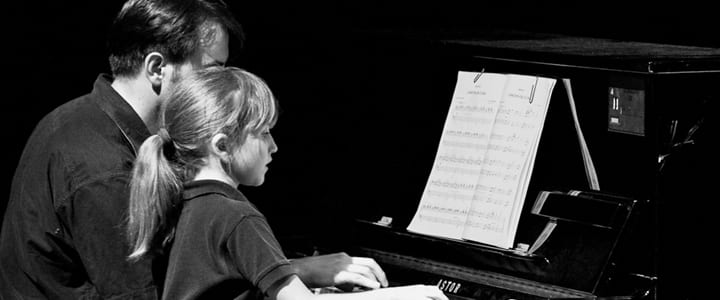
Young children instinctively love to sing, dance, and listen to music, often prompting parents to enroll them in music lessons. This article offers ten excellent reasons your child needs music lessons as part of their overall educational experience and emotional growth.
- Physical Development
Playing an instrument requires tremendous coordination, good posture, and fine motor skills. For example, students studying the violin or piano work on independent finger dexterity, body awareness, and strong core muscles for proper posture. Listening skills and hand-eye coordination also improve with music lessons.
- Cognitive Improvements
Reading music involves detailed problem-solving skills. A child must first learn basic music theory and be able to apply it. It is a complex process to figure out the note name, find the pitch on the instrument, use the correct fingers, and hold it for the indicated value. Music quickly enhances the intellectual skills of young minds.
- Children Learn Real Skills
Dedicated practice and accepting constructive feedback from a music teacher will undoubtedly lead a child to develop an actual ability to play an instrument. Children who practice regularly and acquire good technical skills on their instrument enhance an incredible talent that can last an entire lifetime.
- An Opportunity with a Mentor
Private music teachers are much more than an instructor. They are true mentors that help guide students through setting goals, encouraging progress, and acknowledging their achievements. A great music teacher is often committed to a student for many years, contributing substantially to a child’s emotional and educational success.
- Music Lessons Cultivate Creativity
Playing an instrument provides an excellent outlet for children to express themselves. Music comes in various genres, including classical, jazz, Broadway, and more. Learning and performing favorite pieces is an artistic opportunity to explore loud, soft, lyrical, happy, sad, and many other moods.
- Learn Music History
Children who take music lessons will likely have the chance to study famous composers. Many musicians throughout history led fascinating lives or faced significant challenges. Children can find a connection to composers who also had to practice their instruments during childhood or be inspired by those who triumphed over hardships to find success.
- Build Self-Image Through Positive Accomplishments
Taking music lessons is a way for children to set and accomplish goals. These goals include daily practice, completing entire pieces, yearly recitals, and competitions. Each successful goal instills children with a genuine satisfaction of accomplishment and pride. Music lessons enhance self-image, creating confidence, work ethic, and achievement.
- Share Music With Others
Sharing music with others is vital, and children who take lessons nearly always perform in events for an audience. Studio recitals and concerts allow children to see and hear other performers of all ages and levels and hopefully be inspired. They will likely enjoy hearing a variety of music styles as well.
- Experience Commitment and Resilience
Music lessons provide an opportunity for children to learn commitment and, in the process, develop resilience. It takes years to become good at playing an instrument, which requires patience and long-term goals. Children experience positive rewards and challenging obstacles along the way, allowing them to learn from their mistakes.
- Enjoy the Emotional Satisfaction of Music
Learning and playing music creates many emotions in children and provides a genuine sense of satisfaction. Children can find contentment in developing skills needed to play an instrument, plus an outlet for creativity. Music lessons satisfy numerous physical, intellectual, and artistic interests in many children.
Final Thoughts
Taking music lessons will always remain beneficial to children and their development. It offers a creative path for emotional and intellectual growth. Undoubtedly, children who learn an instrument have a skill that lasts a lifetime.

